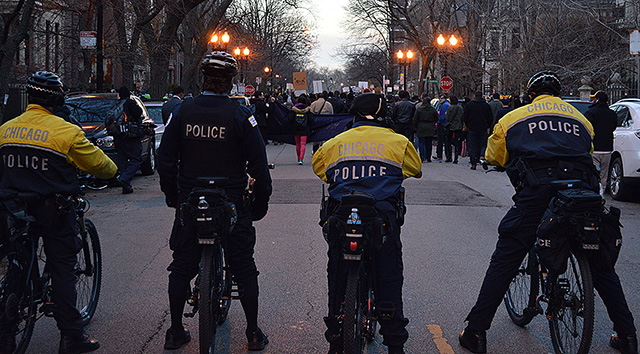Chicago Journalists And Lawyers Annotated All The Police Task Force's Recs
By Mae Rice in News on Apr 21, 2016 6:28PM

By Aaron Cynic/Chicagoist
A team of Chicago journalists, lawyers and educators has used Genius to annotate the almost 200 recommendations laid out in the Police Accountability Task Force report released last week. Titled “Task Force Tracker,” their project was published Thursday, and it’s open to the public—anyone can add an annotation now.
Task Force Tracker was a group effort between civic tech firm Smart Chicago, South Side journalism collective City Bureau, and lawyers from self-described “journalistic production company” the Invisible Institute. Darryl Holliday, the journalist and City Bureau leader who managed the project, told Chicagoist that the goal of the annotation, as initially published, was to contextualize the report. How would executing all these recommendations work? Would it even be possible?
“Overall I think it’s hitting on the right points,” Holliday said, adding that the report’s explicit focus on race was “long overdue.” The biggest question, he said, was whether the city would execute the recommendations. Mayor Rahm Emanuel announced Wednesday that he would implement some of them, but put off the most substantial recommended changes.
Chicago has a history, Holliday noted, of soliciting task force feedback on its police department. “Even in the report, the task force talks about how they are the sixth task force to propose recommendations to reform CPD,” he said. The earliest such report is from 1898, and Holliday said many reform recommendations have stayed consistent, report to report, for more than a century.
Still, there’s reason to think this particular task force report could be higher-impact than its predecessors. This is a time of “expansive attention” to institutional problems within CPD, Holliday said. The department is under scrutiny not only from the task force—which Emanuel created in December, days after the video of the Laquan McDonald shooting was released—but also from the Department of Justice.
As the annotation process unfolded, Holliday said, the team found that some recommendations were simpler to put into practice than others. Some, of course, Mayor Emanuel is already implementing. Another reform Holliday said was viable "right now" is lifting Illinois' requirement that civilians submit a sworn affidavit along with any complaint against a police officer. The affidavit is a legally binding oath that the complaint is true, and submitting one is “more complicated than it seems,” Holliday said; it has to be done in person. According to the task force report, 58 percent of IPRA complaints haven’t been investigated because they lacked an affidavit. “it’s a barrier to the complaint process,” Holliday, said, and could removed relatively promptly if a bill currently moving through Illinois government passes. (On Wednesday, as detailed in this statement, Emanuel committed to making an affidavit override possible in select cases, but the affidavit requirement remains.)
Other recommendations in the report would take longer, Holliday said Tuesday, citing the exact shifts Emanuel put off in his Wednesday announcement: replacing IPRA with a "fully transparent" civilian oversight committee, and reforming the city's contract with the Fraternal Order of Police, the police union, which doesn't expire until June of 2017.
“I know the mayor has basically put his trust into IPRA," Holliday said, "so ... I assume that any move to dismantle it for the time being would not get past the Mayor’s office."
The full annotation, the first project of City Burea’s Community Documenters program, is worth exploring in full; you can check it out, and add your own annotations, here.
Correction, 7 p.m.: The passage about sworn affidavits was updated to clarify that affidavits are required at a state level, not a city level, and that while the affidavit requirement could not be "easily" lifted, as we previously said, it could be lifted relatively promptly by a proposed bill.